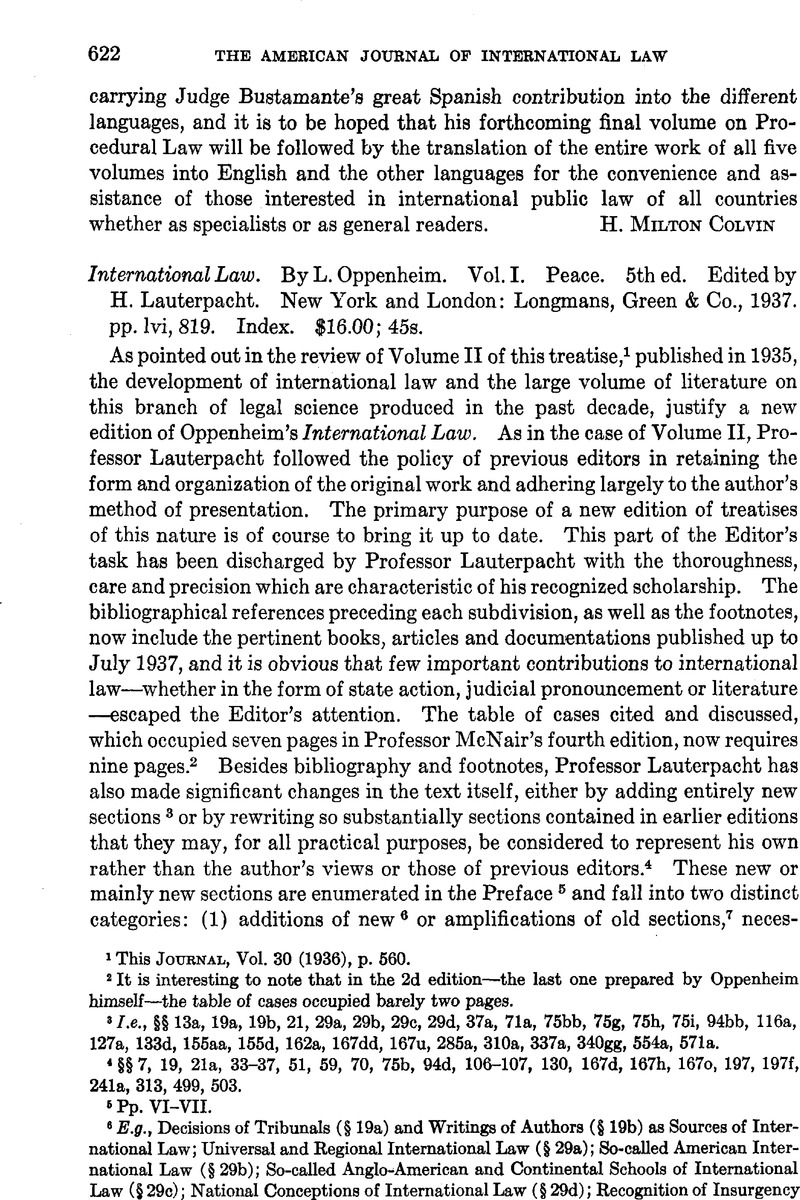No CrossRef data available.
Published online by Cambridge University Press: 12 April 2017

1 This Journal, Vol. 30 (1936), p. 660.
2 It is interesting to note that in the 2d edition—the last one prepared by Oppenheim himself—the table of cases occupied barely two pages.
3 I.e., §§ 13a, 19a, 19b, 21, 29a, 29b, 29c, 29d, 37a, 71a, 75bb, 75g, 75h, 75i, 94bb, 116a, 127a, 133d, 155aa, 155d, 162a, 167dd, 167u, 285a, 310a, 337a, 340gg, 554a, 571a.
4 §§ 7, 19, 21a, 33–37, 51, 59, 70, 75b, 94d, 106–107, 130, 167d, 167h, 1670, 197, 197f, 241a, 313, 499, 503.
5 Pp. VI–VII.
6 E.g., Decisions of Tribunals (§ 19a) and Writings of Authors (§ 19b) as Sources of International Law; Universal and Regional International Law (§ 29a); So-called American International Law (§ 29b); So-called Anglo-American and Continental Schools of International Law (§ 29c); National Conceptions of International Law (§ 29d); Recognition of Insurgency (§75g); Recognition of New Territorial Titles (§ 75h); The Legal Nature of the British Commonwealth (§94bb); Subversive Activities against Foreign States (§ 127a); Japanese Invasion of Manchuria (§ 133d); Abuse of Rights (§ 155a); Regulation of Whaling (§285a); The Hague Codification Conference (§ 310a); The Proposed Convention against Terrorism (§ 337a); Organized Alliances (§ 571a).
7 E.g., General Principles of Law as a Source of International Law (§ 19; see also § 19c); Codification of International Law (§§ 33–37); Different types of Mandates (§94d); the Status of Vatican City (§§ 106–107); the Bosphorus and the Dardanelles (§ 197); Wireless Communications (§ 197f); Regulation of Statelessness by Treaty (§ 313).
8 Persons other than States Subjects of International Law (§ 13a); The Monistic Doctrine (§21); The Legal Nature of Recognition of States (§71a); The Legal Nature of Recognition of Governments (§ 75bb); Obligations of non-Recognition (§ 75i); State Equality and International Organization (§ 116a); The Covenant of the League as a System of Legal Obligations (§ 167u).
9 E.g., The “Family of Nations” a Community (§ 7); The Law of Nations as Part of Municipal Law (§ 21a); The Problem of Sovereignty in the 20th Century (§ 70); What Acts of Self-Preservation are Excused (§ 130); Reconsideration of Treaties and International Conditions (§ 1670); Renunciation of War and Title by Conquest (§ 241a); Effect of Coercion of a State or its Representative [i.e., on the validity of treaties] (§499); Treaties Inconsistent with Former Treaty Obligations (§ 503).
10 See, e.g., §§75i, 116a, 130, 241a, 499.
11 § 116, p. 225.
12 § 37.
13 Also in note (2) on p. 57.
14 E.g., a single footnote [p. 80, note (1)] was substituted for §§ 44–50c containing a survey of the principal events of diplomatic history from 1648 to 1928, which occupied thirty pages in the 4th edition.